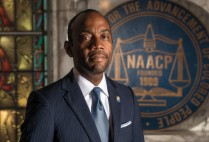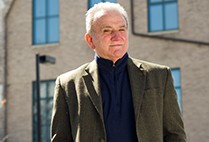Debating Silber’s Legacy
The opinion expressed in this article (“Silberado,” Winter–Spring 2015) that John Silber “turned around a moribund streetcar school” lacks historical perspective. When Silber arrived in 1971, BU was not a “streetcar school” in the traditional meaning of that term. Thousands of out-of-state students attended BU and lived both on and off campus. Also, BU was not “moribund.” It was a large, vibrant, well-regarded university with good students, a good faculty, and good resources.
Joel Krakow (CAS’73)
Newton, Mass.
I strongly suspect you will not be interested in hearing a dissenting voice to Tom Wolfe’s lionizing of John Silber. And I am certainly deficient in the star power department in comparison to Wolfe (Hon.’00). But here is mine.
I was a sophomore at BU when Silber became president. The immediate effect of his presidency on me was the abolition of the excellent Honors Program that had initially brought me to BU and the reduction of the full-time course load of five three-hour classes per semester to four four-hour classes with no cost/benefit gain for tuition paid. Additionally, in a time when the sentiment among many Americans that there was something horribly wrong with the Vietnam War was growing, Silber treated those of us who expressed our discontent with the war as pariahs.
I understand Boston University is considered to be a more credible academic institution today than it was at the time Silber took the helm; this is an accomplishment for others to celebrate. The legacy of Silber’s reign for me was the destruction of the academic environment I chose when I decided to enroll in BU and resentment of the dictatorship I perceived to serve interests other than mine and those of my fellow BU students.
Eric Rosenbaum (CAS’72)
Yonkers, N.Y.
John Silber gave the Commencement address in 1996, the year I graduated. I remember it well—I was hoping for Oprah Winfrey, and instead I got cranky old Silber. I was not a fan, though I will likely purchase a copy of Silber’s book. In my older age, I can probably appreciate his wisdom much more than I did as an undergraduate.
Adrianne (Scully) Spencer (COM’96)
Moraga, Calif.
Visionaries are seldom appreciated in their own time. John Silber demanded that Boston University strive for excellence. If that angered his opponents, he did not seem to care. While this article seems to damn his accomplishments with faint praise, Silber’s contributions to education and to BU’s legacy will never be forgotten. I am honored that he served as president of my alma mater. With that said, President Brown’s tenure has been quite impressive in its own right, and I hope that he is duly recognized for raising BU’s stature even more following Silber’s departure.
Steven Masse (CAS’93)
Randolph, Mass.
Wolfe incorrectly states that Arthur G. B. Metcalf (SED’35, Hon’74) founded the Boston University College of Engineering. What is true is that Metcalf and Hilding N. Carlson cofounded the department of aeronautical engineering in the College of Business Administration. Carlson, who began teaching aeronautics at a vacant American Airlines building at Boston’s Logan Airport in 1928, launched the New England Aircraft School in 1940. The school was eventually deeded to BU and renamed the College of Industrial Technology in 1951, consolidated in one building on the BU campus in 1963, and renamed the College of Engineering in 1964. By that time, the college offered BS programs not only in aeronautics, but in technology and management as well. So, it would be more accurate to say that Metcalf helped plant the seed of what would become the Boston University College of Engineering.
Mark Dwortzan (COM’98)
Editor/Writer, BU College of Engineering
I read fondly the essay by Tom Wolfe (Hon.’00) on John Silber. Wow, Tom Wolfe, quite an honor. I will definitely go out and buy the book.
I have actually good memories of John. I was an assistant professor at the old College of Basic Studies, CBS (today the College of General Studies, or CGS), in the early 1980s, teaching social science and Western Civ courses. It was a great experience. By that time, John had consolidated his power, and all the deans were gone except Dean Brendan Gilbane of CBS. My chairman was the late Fred Koss. Most of the faculty were at odds with Silber; I was the only one who wasn’t. In fact, I even worked in his campaign for governor, an event that has often been forgotten.
I admired his tough stance against political correctness and know-it-all students. Faculty gave in to both. I could always count on him to back me; even his good friend William (Billy) Bulger (Hon.’96), when he was head of the UMass system, was my friend and supporter, and whenever I had a student who complained about a grade or some other trivial thing, they backed me.
Today, it is different and much worse for teachers. Students and “PC” professors are always “correct.”
Thank you, John Silber, for setting those standards. I actually miss you, you old curmudgeon.
Jack Nusan Porter
Research associate, Davis Center for Russian and Eurasian Studies
Harvard University
This letter is to commend you for the fine article by Tom Wolfe on John Silber. At the time of Silber’s death, I felt the coverage of his accomplishments was largely overlooked. “Silberado” makes up for that. I was delighted to read it and learn more about how he helped shape BU on the road it leads today.
David Crowley (COM’56)
San Jose, Calif.
The Dugout: Part of the BU Fabric
Thanks for the fun article on the Dugout (“The Little Dive with a Long History,” Winter–Spring 2015). My great memories go back to 1968. After DGE midterms, we descended on the Dugout at 10 in the morning. The only song on the jukebox was “Hey Jude.” And the beers kept coming. A key part of the BU fabric. Thanks again.
Lisa Schmid Halpin (DGE’69, Questrom’71)
Buffalo Grove, Ill.
On a cold November 1956 evening I was served my first legal, but not my first ever, draft at what was commonly referred to as the “D-O.” I think the barkeep’s name was Ruby, as he wore a large red ring. The beer was unbranded and cost 25 cents.
In my senior year I took a night course, which the professor introduced by saying we could discuss anything and meet anywhere. You guessed it, off to the “D-O.”
Thanks for the article.
Jack Mulkeen (Questrom’58)
Buzzards Bay, Mass.
I had to laugh when I read the very lovely article about the Dugout. When I was in my doctoral program, one incoming student was French—she was quite anxious to eat there during the first few weeks of school. I couldn’t quite understand it until she pronounced the name of the bar as “duh goo,” or literally, taste. She thought it was a restaurant serving French cuisine. Actually, if it had been, it probably would have been gone by now. The Dugout survives when so many other eateries/bars have folded over the years.
Nan Bernstein Ratner (SED’82)
Bethesda, Md.
Memories of a Late US Senator
I was interested to read your article about Senator Edward Brooke (LAW’48,’50, Hon.’68) (“Remembering a Pioneering Politician,” Winter–Spring 2015).
Perhaps you did not know that his cousin Adelaide Cromwell (Hon.’95), a professor emerita, was a professor of sociology at Boston University from 1951 to 1985. Cromwell cofounded the BU graduate program in African studies and was later founding head of the University’s graduate program in Afro-American studies.
Cromwell still has fond memories of her cousin. Their lifelong relationship began in Washington, D.C., where they were born one month apart, grew up, and attended Dunbar High School together. In his book Bridging the Divide, Brooke wrote that Cromwell was “like a sister to me.” They remained dearest friends until his death.
While institutional memories may fade, it is of interest to note that not only did Boston University play an important role in the life of Brooke, but also in the career of his distinguished cousin, who resides in the Boston area.
Beverly Gray
Former chief, African and Middle Eastern Division
Library of Congress
Not-So-Sound Advice?
I found the quoted advice offered by the late Professor James Spruill (CFA’75) to young acting student Jason Alexander quite disturbing (“Seinfeld’s Costanza Gives Master Class in Acting at CFA,” Winter–Spring 2015). A 20-year-old, about to embark on a most difficult career path, needed encouragement, not words like “you will never play Hamlet.” Did he really need to hear that? Of course, the hard truth is that Jason Alexander as Hamlet in the commercial theater was not going to happen. But would Jim Spruill have given that advice to a black actor? Or a disabled actor?
I have been a director in regional theaters for nearly 60 years, where I cast actors by talking with them, listening to them to find out what they felt and thought, hearing them read. What they look like is a consideration, but not nearly as important as one might think. As theater people know, casting a play is a lot like shooting craps.
Harvey Widell (CFA’57)
Boynton Beach, Fla.













































Related Stories
Doctor of Humane Letters to Be Awarded to George Wein (CAS’50)
Newport Jazz Festival founder, Grammy winner, philanthropist
Ha Jin Elected to American Academy of Arts and Letters
Highest US recognition of artistic merit for CAS prof
BU to Award Doctor of Humane Letters to Big Bang Theory Star
Mayim Bialik, actress, neuroscientist, author
Post Your Comment